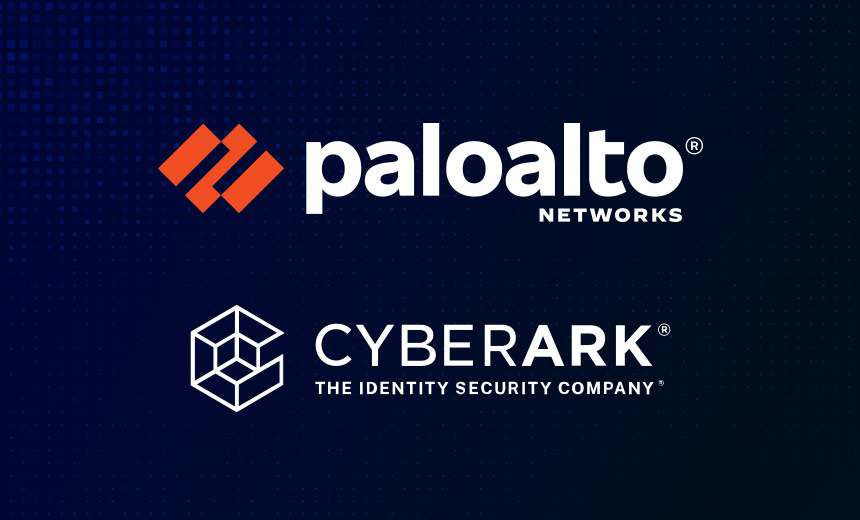Artificial Intelligence & Machine Learning
,
Cloud Security
,
Network Firewalls, Network Access Control
A Look at How the 2nd Largest Deal in Cyber History Nearly Fell Apart in the 11th Hour

The second-largest acquisition in cybersecurity history started with an initial outreach in 2023. The seller nearly walked away, and then both firms followed an accelerated announcement timeline because of media leaks.
See Also: On Demand | From Patch to Prevention: Modernizing Remediation Across Hybrid Environments
Palo Alto Networks CEO Nikesh Arora first approached CyberArk founder and chairman Udi Mokady about a potential acquisition back in May 2023, but Mokady said CyberArk wasn’t interested and wished to continue pursuing its standalone strategy. CyberArk disclosed Tuesday how Palo Alto’s proposed $25 billion acquisition came together in advance of a Nov. 13 vote on the deal by the firm’s shareholders.
After a two-year hiatus, Arora told Mokady on June 4, 2025, that Palo Alto Networks was interested in acquiring CyberArk, and requested an in-person meeting, which took place June 17. The companies entered into a mutual nondisclosure agreement on June 25, and Palo Alto Networks submitted a non-binding letter of interest on July 1 for an all-stock acquisition of CyberArk at a price of $457.99 per share.
The CyberArk board identified “the distinct benefits of a potential transaction with PANW as compared to other potential acquirers, including the unique strategic rationale for a transaction with PANW, the strategic alignment between CyberArk and PANW and the potential to meaningfully accelerate CyberArk’s vision of delivering its leading identity security platform globally and at scale,” CyberArk wrote (see: It’s Official: Palo Alto Networks to Buy CyberArk for $25B).
Closing the Gap on Deal Price, Termination Terms
The company’s board determined on July 4 that contacting other potential acquirers would not be in the best interests of CyberArk or its shareholders considering the risk of media and industry leaks. Two days later, Mokady delivered to Arora a counterproposal that valued CyberArk’s stock at $525 per share and included a $2 billion termination fee payable by Palo Alto if the deal doesn’t get regulatory backing.
On July 7, Arora submitted a revised proposal of $480 per CyberArk share and no termination fee since he believed the complementary nature of Palo Alto Networks’ and CyberArk’s businesses wouldn’t draw the ire of regulators. Mokady countered July 9 with an offer of $510 per CyberArk share and a $2 billion reverse termination fee, and Arora volleyed back by offering $495 and a $500 million termination fee.
Mokady and Arora met July 10, with the former telling the later CyberArk wouldn’t keep negotiating if the termination fee stayed at just $500 million. Palo Alto Networks agreed to double the termination fee it would pay to $1 billion while keeping all other terms the same. Mokady told Arora that CyberArk would move forward with negotiations, but Arora said an exclusivity agreement would be needed to continue.
In response, CyberArk and Palo Alto Networks on July 12 entered into an exclusivity agreement pledging that the former would negotiate exclusively with the later until Aug. 6. 12 days later, Palo Alto told CyberArk it wanted to accelerate the timeline for signing the deal from Aug. 7 to an earlier date since Calcalist reported on July 21 that Palo Alto was in discussions to buy another cybersecurity company.
“The risk [is] that solicitation of third-party interest could lead to the sale process becoming known to the broader market and deterring PANW [Palo Alto Networks] and causing it to withdraw its offer,” CyberArk wrote.
Things Nearly Fall Apart at the Last Minute
On July 27, Arora called Mokady and told him Palo Alto’s previous offer of $495 per share no longer had the support of the company’s board due to changes in the companies’ respective stock prices, instead submitting a proposal for $475.21 per CyberArk share. Mokady said Arora’s proposal was unacceptable, and CyberArk told its advisors to stop working on the Palo Alto Networks transaction later that evening.
“The CyberArk board determined that the July 27 proposal was not in the best interests of CyberArk and the CyberArk shareholders,” CyberArk wrote. “Later that day, representatives of CyberArk sent a letter to representatives of PANW directing PANW to return or destroy information that had been provided under the mutual nondisclosure agreement between the parties.”
Palo Alto’s financial advisor J.P. Morgan reached out to CyberArk’s financial advisor Qatalyst Partners on July 28 to convey the Palo Alto’s willingness to consider a revised offer a $489.45 per CyberArk share, but Mokady and CEO Matt Cohen told Qatalyst that CyberArk would likely be unwilling to proceed on this basis. Later that day, Palo Alto representatives sent a “best and final” proposal of $495 per share.
CyberArk’s outside legal counsel noted this draft of the acquisition agreement offered greater certainty of closing and contained a $750 million termination fee payable by CyberArk to Palo Alto Networks if the transaction is terminated because the CyberArk board determined to pursue a superior competing proposal. On July 30, CyberArk’s board unanimously approved the execution and delivery of the deal.
Following the CyberArk board meeting, Palo Alto Networks and CyberArk executed the agreement and issued a joint press release announcing the transaction prior to market open on July 30.
“Based on those negotiations and PANW’s indication that its offer was best and final, the merger consideration represents the best proposal and economic value available to CyberArk shareholders and that the merger agreement contained the most favorable terms to CyberArk in the aggregate to which PANW was willing to agree,” CyberArk wrote.
